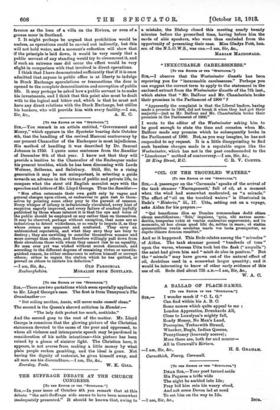GOVERNMENT AND MONEY.
[To THE EDITOR OF THE "SPECTATOR."]
Sra„—Throngbout this controversy it appears to me that the one charge brought against Mr. Lloyd George has been that he has utilized for his private advantage information received from a Government contractor, and this has been doubly unfortunate. In the first place, it has enabled him to ride off on a side issue, and reiterate his righteous indignation that there could be anyone so base as to imagine him capable of such conduct, and as none but the most extret .e partisan would suppose that he realized that he was laying himself open to such a charge, this has proved of considerable value to him. In the second place, the main issue has been obscured —I mean the much wider and more important principle that no Minister or public servant should be allowed in any circum- stances to gamble or speculate on the Stock Exchange. The principle, indeed, seems so elementary as hardly to require to be enunciated, but I am afraid there is a good deal of confusion on this point, for I have several times heard the remark, "Why should a Cabinet Minister not have a flutter if he feels inclined to ? " It is therefore perhaps as well to examine the matter thoroughly from every point of view, and I venture to lay down the following considerations :— 1. Everyone in the service of the Crown (in Government employ) may at any moment, and those in the highest positions do very often, become the early possessors of important information, which they are bound to treat confi- dentially, and it would be a serious breach of confidence if that information was utilized for private advantage or profit.
2. Anyone buying or selling shares or stocks (apart from investment, which may be left on one side for the moment) admittedly does so in the hope of making money, and cannot help being influenced by any information which he may happen to obtain from any source.
3. Operations on the Stock Exchange are absolutely different from any other buying or selling, inasmuch as the purchase or sale does not relate to any property or concrete thing which changes hands over the transaction; in fact, shares of a com- pany may be bought and sold in one month representing far more than the whole of its capital.
4. The prices of shares and stocks are, of course, influenced to some extent by their intrinsic value, but to an infinitely greater extent by the pressure to buy or sell on the part of operators, every purchase tending to raise, and every sale to lower, the price.
5. The purchase and sale of stocks and shares must be executed through a broker on the Stock Exchange. The prices are public property, and it is soon known to a con- siderable circle whether important interests are buying or selling.
6. It can surely be realized what an important effect would be produced by the knowledge that a Cabinet Minister or highly placed official was operating, even if this knowledge was confined to a few, for, human nature being what it is, the temptation to a broker to operate for himself a few minutes before operating for such a client would be practically irresistible, while without giving any reasons he would naturally advise others to follow suit, drawing the natural conclusion that there were solid reasons to justify the client's operations. The broker with such a client would have an assured income, and could well afford to place at the latter's disposal such small
favours as the loan of a villa on the Riviera, or even of a grouse moor in Scotland.
7. It might perhaps be argued that prohibition would be useless, as operations could be carried out indirectly, but this -will not hold water, and a moment's reflection will show that if the principle is laid down, it would be very rarely that a public servant of any standing would try to circumvent it, and if such an extreme case did occur the effect would be very slight in comparison with that involved in direct operations.
I think that I have demonstrated sufficiently that if it is once admitted that anyone in public office is at liberty to indulge in Stock Exchange speculations or transactions the door is opened to the complete demoralization and corruption of public life. It may perhaps be asked how a public servant is to make his investments, and I think that this point also must be dealt with to the logical and bitter end, which is that he must not have any direct relations with the Stock Exchange, but utilize his bankers, who will provide him with every facility.—I am,















































 Previous page
Previous page